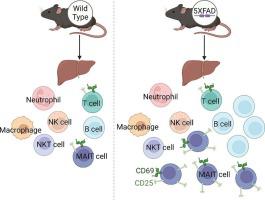当前位置:
X-MOL 学术
›
J. Neuroimmunol.
›
论文详情
Our official English website, www.x-mol.net, welcomes your feedback! (Note: you will need to create a separate account there.)
Enrichment of liver MAIT cells in a mouse model of Alzheimer's disease
Journal of Neuroimmunology ( IF 3.3 ) Pub Date : 2024-03-21 , DOI: 10.1016/j.jneuroim.2024.578332 Season K. Wyatt-Johnson , Holly N. Kersey , Randy R. Brutkiewicz
Journal of Neuroimmunology ( IF 3.3 ) Pub Date : 2024-03-21 , DOI: 10.1016/j.jneuroim.2024.578332 Season K. Wyatt-Johnson , Holly N. Kersey , Randy R. Brutkiewicz

|
Emerging evidence has supported a role for the immune system and liver in Alzheimer's disease (AD). However, our understanding of how hepatic immune cells are altered in AD is limited. We previously found that brain mucosal-associated invariant T (MAIT) cell numbers are increased in AD. Furthermore, loss of MAIT cells and their antigen-presenting molecule, MR1, reduced amyloid-β accumulation in the brain. MAIT cells are also significantly present in the liver. Therefore, we sought to analyze MAIT and other immune cells in the AD liver. Increased frequency of activated MAIT cells (but not conventional T cells) were found in 8-month-old 5XFAD mouse livers. Therefore, these data raise the possibility that there is a role for peripheral MAIT cells in AD pathology.
中文翻译:

阿尔茨海默病小鼠模型中肝脏 MAIT 细胞的富集
新的证据支持免疫系统和肝脏在阿尔茨海默病 (AD) 中的作用。然而,我们对 AD 中肝脏免疫细胞如何改变的了解有限。我们之前发现,AD 患者的脑粘膜相关不变 T (MAIT) 细胞数量有所增加。此外,MAIT 细胞及其抗原呈递分子 MR1 的丧失会减少大脑中β淀粉样蛋白的积累。 MAIT 细胞也大量存在于肝脏中。因此,我们试图分析 AD 肝脏中的 MAIT 和其他免疫细胞。在 8 个月大的 5XFAD 小鼠肝脏中发现激活的 MAIT 细胞(但不是常规 T 细胞)的频率增加。因此,这些数据提出了外周 MAIT 细胞在 AD 病理学中发挥作用的可能性。
更新日期:2024-03-21
中文翻译:

阿尔茨海默病小鼠模型中肝脏 MAIT 细胞的富集
新的证据支持免疫系统和肝脏在阿尔茨海默病 (AD) 中的作用。然而,我们对 AD 中肝脏免疫细胞如何改变的了解有限。我们之前发现,AD 患者的脑粘膜相关不变 T (MAIT) 细胞数量有所增加。此外,MAIT 细胞及其抗原呈递分子 MR1 的丧失会减少大脑中β淀粉样蛋白的积累。 MAIT 细胞也大量存在于肝脏中。因此,我们试图分析 AD 肝脏中的 MAIT 和其他免疫细胞。在 8 个月大的 5XFAD 小鼠肝脏中发现激活的 MAIT 细胞(但不是常规 T 细胞)的频率增加。因此,这些数据提出了外周 MAIT 细胞在 AD 病理学中发挥作用的可能性。



























 京公网安备 11010802027423号
京公网安备 11010802027423号